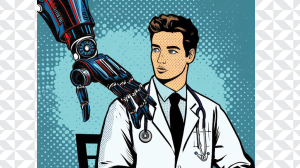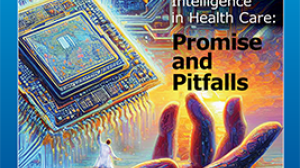ChatGPT Enters the Classroom
Virtually instantaneous help in writing essays, planning trips, making dinner reservations, creating equations, and much more is drawing more and more people to ChatGPT. School of Medicine faculty are using its capabilities to improve the learning experiences of their students and assist with their own research.
ChatGPT is a chatbot developed by Open AI that uses natural language processing (NLP) technology to answer questions in a conversational tone.
The program has exploded in popularity in the last year. “It’s really just one more advance in a long series of advances in AI, but this advance happened almost overnight, and gave much more impressive results,” said David Page, PhD, chair of the Department of Biostatistics and Bioinformatics. He’s been studying AI and NLP for 35 years.
Many people have concerns about the potential for misuse, but Duke faculty find ChatGPT’s energy-saving capabilities to be its best asset. “It can help you overcome the initial hesitation to get started on a new project,” said Matthew Engelhard, BSE’05, MD, PhD, assistant professor in the Duke Department of Biostatistics and Bioinformatics.
Users enter the information they’re looking for in the prompt textbox, and ChatGPT instantly generates a response. “Let’s say you’ve outlined a new model or approach you want to develop,” Engelhard said. “You can have a dialogue with these systems and say, ‘I’d like you to write code that has these characteristics, and these objectives.’ The result might not be exactly what you need, but it’s often a helpful starting point.”
Page is exploring using ChatGPT to help with scientific papers and grant proposals. “For someone who’s an expert and just wants to save the time writing, it’s very good because it can give you a great first draft and you can correct it and maybe go back and forth with it several times,” Page said.
David Carlson, BSE’10, MS’14, PhD’15, assistant professor in Duke’s Department of Civil and Environmental Engineering and the Department of Bioinformatics and Biostatistics, said the instantaneous feedback and constructive criticism that ChatGPT provides has facilitated student growth in his software engineering classes.
“It’s not so much that it’s doing the work for the student, it’s that it’s working with the student to help them come up and improve their results or improve their scientific documents,” Carlson said.
Carlson said the system’s timely responses are one of the main educational benefits. “If you get feedback quickly, you learn a lot better,” he said. “Before, a student would write something and send it to me. But sometimes it could be days before somebody has time to look at it. With the instantaneous feedback, it allows you to really be in the mindset of writing and improve it rapidly.”
Carlson said some students have been enamored with the system, while others have been more hesitant.
But none of them are ignoring the obvious dangers of misusing ChatGPT. To quell concerns about cheating, Carlson is adjusting the way he gives homework. He plans to increase the number of coding problems, but also add conceptual questions about the results.
Engelhard plans to use ChatGPT in his fall graduate student classes. He believes students’ drive and motivation to learn will sway them from using the system to try to cut corners on assignments. But its use will need to be monitored, and students must have a foundational understanding of the subject matter.
“It’s not so different from using a calculator in math class,” he said. “There are cases where you need to put ChatGPT to the side to make sure that you are understanding the relevant concepts yourself, as opposed to using it as a crutch.”
More broadly, concerns about ChatGPT’s accuracy are growing. Page said ChatGPT doesn’t yet fact-check itself and is still very unreliable when used as a search engine. “It will sound very authoritative and give you an answer, and it may even cite references and say, ‘Here’s where I’m getting this information.’ But the references may be all made up. It’s just trying to look realistic and not really be realistic,” Page explained.
While many have expressed their concerns about how ChatGPT and other systems will influence society, others are looking forward to seeing what’s next. “The systems are far from flawless, but I’m also extremely excited about the opportunities and how we can improve student outcomes by taking advantage of these technologies,” Carlson said.
Story by Synclaire Cruel. Originally published in DukeMed Alumni News, Fall 2023.
Read more from DukeMed Alumni News




